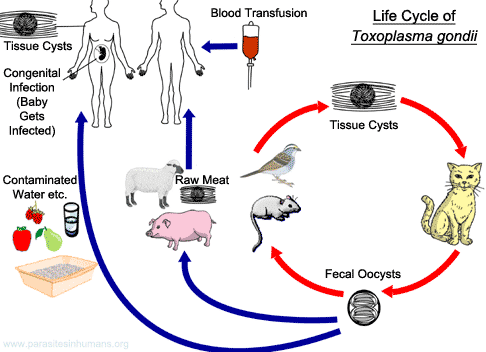The Zombie Parasite
Alright, buckle up. This is a tale of a not-so-ordinary parasite called Toxoplasmosis gondii. Now, you might think parasites are usually found in exotic places or deep within some creature's guts, but nope, this one’s right under our feet—in the soil. Yeah, that’s right. But let’s dig into why this little critter is way more interesting (and creepy) than your average dirt dweller. Meet Toxoplasmosis, a parasite that, like all parasites, has a life-cycle it's desperate to complete. To do this, it needs to find the perfect host, which happens to be a cat, specifically the cat’s intestine. Why? Because that's the only place it can reproduce and create more of itself to ensure its genes get passed on. But how it achieves this goal is the stuff of nightmares. Cue the “Zombie parasite” nickname.
So, how does it get there? Anything contaminated by an infected cat’s feces can start the parasite's journey back to a new cat host, especially any nearby water or soil. Enter the humble mouse, often scurrying around in these areas and unknowingly becoming the parasite's next victim. Being inside a mouse significantly ups the parasite's chances of being eaten by a cat. At this point, you'd think Toxoplasmosis would just roll with the odds. But no, it's not leaving things to chance. Instead, Toxoplasmosis rewires the mouse's brain, making it unafraid of cats. Crazy, right? Infected mice are even attracted to the smell of cat urine. This mind control makes the mouse engage in risky behavior, almost guaranteeing it will be caught by a cat, thus completing the parasite's life-cycle.
Now, this “mind control” trick isn’t just a rodent thing. It turns out, humans can also be affected by Toxoplasmosis, showing similar zombie-like behavior. Studies have shown that infected humans tend to engage in more high-risk activities, are more suspicious and jealous, and are more likely to be schizophrenic or bipolar. They’re also more prone to committing suicide and are 2.65 times more likely to get into car accidents. Oh, and by the way, it's estimated that 30-50% of the global population is infected with Toxoplasmosis. Feeling a bit like The Walking Dead now, huh?
“... 30-50% of the global population is estimated to be infected with Toxoplasmosis”
Why does Toxoplasmosis mess with humans this way? It’s not entirely clear. Altering human behavior doesn't necessarily help the parasite get back to a cat, which is its ultimate goal. Some scientists think that by increasing human mortality, the parasite gets another shot at infecting a cat, maybe via a mouse. Others suggest that prehistoric humans were hunted by big cats, and from the parasite's perspective, humans and mice were both just cat food. This idea is backed up by the fact that infected humans don’t find the smell of cat urine as repulsive as non-infected folks.
A retina damaged by Toxoplasmosis, leading to blindness. The whitish yellow lesion in the centre of the photo is scar tissue related to a Toxoplasmosis cyst. Copyright Dr. Robert Burke, 2017
Either way, Toxoplasmosis is definitely out there, with staggering infection rates worldwide. Since it's prevalent in soil and many animal tissues, it's crucial to wash produce thoroughly and cook meat (especially pork) to kill any lurking parasites. If you have a cat, change its litter frequently to prevent any Toxoplasmosis in the area from starting its journey.
Most people, if infected, will experience flu-like symptoms, but a healthy immune system will corner the parasite, forcing it to form a small cyst and lie dormant. However, immunocompromised individuals and pregnant women need to be extra cautious. The parasite can invade the brain and eyes, causing significant damage. It particularly likes the retina, where it can destroy tissue, leading to vision loss or blindness. This is why pregnant women should be careful around cat litter and use gloves when gardening.
There’s still a lot of debate among scientists about whether Toxoplasmosis really affects human behavior. Some studies have tried to control for variables and didn’t find strong evidence supporting the idea that it alters human actions. So maybe you don't need to start stockpiling supplies for the zombie apocalypse just yet.
Dr. Burke is an optometrist practicing at Calgary Vision Centre. He does his best to interrupt the Toxoplasmosis lifecyle with mouse traps in his attic. Opinions above do not constitute medical advice, and readers should consult with their optometrist if they have questions or concerns about their eye health

